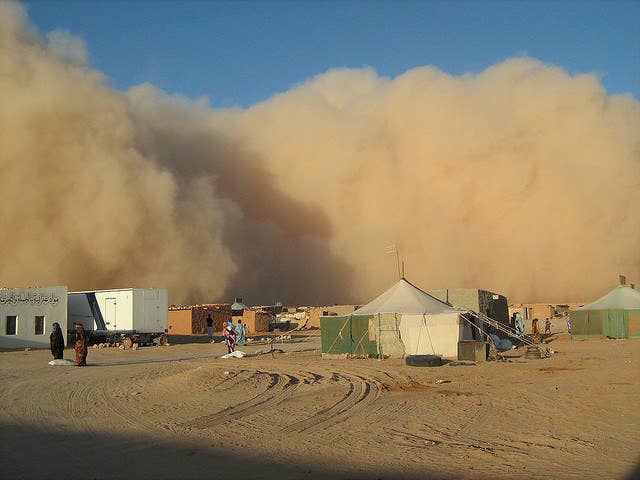
NAIROBI — A young woman who was adopted by a Spanish family more than a decade ago is being held against her will by her biological parents in Western Sahara. Her biological father has threatened to kill her rather than let her return to Europe, according to her adoptive family.
The 23-year-old Spanish citizen, Mahdjouba Mohamed Hamdidaf, was born in Tindouf refugee camp in Western Sahara, which lies on the borders of Morocco, Mauritania, and Algeria.
Hamdidaf visited Spain for the first time on an exchange program in 1999. She returned to Spain each summer, and in 2003 was adopted by a Spanish family. On her most recent visit to see her biological family, they decided they would not allow her to return to Europe, her home for more than a decade.
"We prefer to see you dead than back in Spain," her biological father told her, according to a text message written by Hamdidaf and seen by BuzzFeed News.
"Please save me," she wrote. "I am to do something stupid."
The trip began in late July, when she went to Tindouf with her adoptive father, who has written a book about the region. He returned to Spain a week later, and she was due to follow suit on August 18.
"A few days before, we got a call from her to say her father was not going to let her return," Vero Llopes Vines, Hamdidaf's adoptive sister, told BuzzFeed News by telephone from Spain. He "told us to leave her in peace," Vines said.
"We were initially in contact with her by mobile phone every day, but her father has stolen the phone," the sister said. Sometimes Hamdidaf is allowed to use family members' phones to communicate with her adoptive family, but the communication has become less frequent, Vines added.
Her biological parents have confiscated her Spanish passport and threatened to burn it, according to Radidja Nemar, a human rights officer with Alkarama Foundation, a human-rights organization focused on the Arab world.
"It's a crime under Algerian law, but the problem is, it's politically very sensitive," Nemar said.
That's because Western Sahara, though it claims independence, has never been recognized as autonomous. The former Spanish colony is split between Morocco and Algeria. On the Algerian side, it is monitored by Algerian military police and governed by the Polisario, which the United Nations recognizes as the representative of the Sahrawi people.
Hamdidaf's extended biological family includes influential members of the Polisario, both in Western Sahara and abroad, further complicating the political sensitivity of the alleged kidnapping.
Hamdidaf's biological parents' motivation is not entirely clear to her Spanish family or to Nemar. BuzzFeed News did not reach out to her biological parents for comment out of concern for Hamdidaf's safety.
But Hamdidaf is her biological parents' only daughter, and Nemar suspects her family has felt the social pressures about gender and culture.
Western Sahara is often characterized as a progressive place for women, who have more economic and social rights there than in places like Saudi Arabia, Nemar said. But there are still strict ideas about what's appropriate, especially for a family's lone daughter, and about physical control.
"I think some people ... started pressuring her family, saying, 'How could you let your only daughter live like a European?'" Nemar said. "It's a sort of question of honor here for the family and they are forcing her to be on one side, either Sahrawi or Spanish, and they want her to abide by the social customs of being Sahrawi. They want to take back control of her, physically and mentally, using a lot of psychological pressure on her."
In one of her text messages, Hamdidaf, who is known as Mayuba, said her biological family had seen pictures of her ordinary life as a young, Westernized woman. "My mum is calling me whore," she texted.
Nemar's organization filed a formal complaint with the prosecutor in Tindouf on September 17. The complaint is supposed to be investigated by police within 24 hours but it has received no response, Nemar said.
"They ... don't want to interfere in what they consider a family matter," Nemar said.
The complaint also pinpointed Hamdidaf's location last week, when she was being held in a house outside of Tindouf. The police did not follow up on the information, and she was then moved back to the camp.
The Spanish consulate in Western Sahara has been involved in the case, and Nemar's organization has filed a complaint with the office of the U.N. Special Rapporteur on Violence Against Women, which sits within the U.N. Human Rights Council.
On Thursday, Hamdidaf's Spanish family said she managed to text that her biological family was considering moving her outside of the camp again — a turn of events her adoptive family would consider alarming.
"As long as we know where she is, we can act and still try to get her out but if they sort of make her disappear ... it will get even more complicated," Nemar said. "We will know still who made her disappear, so we will still know whom to ask. But ... especially if she's mistreated or she's taken to a place where she doesn't even know where she is, she becomes even more vulnerable."
Hamdidaf has expressed fear and psychological stress in her communications to her Spanish family — emotions they, too, are experiencing.
"My parents are really suffering, but we are doing everything possible to get Mayuba back alive and well. She is their daughter, and they love her like one," Vines said. "I'm coping as best I can. She's my little sister, and I love her like my other sister."
